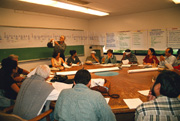![[Currents header graphic]](http://www.ucsc.edu/homeart/currents_header.gif)
![[Currents header graphic]](http://www.ucsc.edu/homeart/currents_header.gif)
September 28, 1998

|
|
The first Summer Institute attracted 24 community activists from Mexico, Latin America, and the U.S. (more photos)
|
For eight days in September, Merrill College was abuzz with activity as 24 community activists from the U.S. and Latin America converged for the first Summer Institute sponsored by the Latin American and Latino studies program.
The theme of the institute was "Social Change Across Borders," and it drew participants from Mexico, Guatemala, and El Salvador, as well as California, New Mexico, Texas, and Chicago, who are working on issues such as immigration, labor organizing, economic development, women's rights, and community empowerment.
The purpose of the institute was to bring community organizers from both sides of the border together with academics in an educational setting for skill building, reflection, collaborating, and long-term planning. The gathering provided a rare structured opportunity for transnational organizing, allowing busy community leaders to step back from their work, assess their accomplishments, reflect on global policy trends that affect their work, and outline some goals for the future, said LALS chair Manuel Pastor.
"These are people with busy schedules and high-pressure jobs, and they get very little time for this kind of networking," said Pastor, who plans to offer similar summer retreats each year. "Organizations dedicated to social change typically operate on budgets that don't allow for much reflection. Our goal was to provide a setting that would revitalize participants so that they could return to their work with new energy and ideas."
By the end of the week, the institute was receiving high marks from participants.
Jorge Lara, a community organizer from Pacoima, a town in the San Fernando Valley, used adjectives like "interchange" and "cooperation" to describe his experience at the institute.
"The global economy can be terrifying, and it's easy to feel that you have no say," he said. "But now I know I have a say. Working locally can be a very powerful way of getting control--economically and politically."
Jenny Dineen Ocon, who graduated from UCSC in 1992 with a degree in Latin American studies and community studies, found the retreat stimulating.
"I wanted to connect with people around immigration issues, and this was a perfect place to do that," said Ocon, who is the citizenship coordinator for the Northern California Coalition for Immigration Rights in San Francisco. "This gave me an opportunity to think about how we can link up our work with what other people are doing. Globalization has made this a smaller world, and linking up here points out how we can all work together."
Institute organizers filled the agenda from morning to eve with sessions that ranged from grant writing to using the World Wide Web for social change. Field trips took participants to sites in Watsonville, San Jose, and Barrios Unidos in downtown Santa Cruz. UCSC facilitators included Patricia Zavella, John Borrego, Walter Goldfrank, Jonathan Fox, Guillermo Delgado, Helen Shapiro, Susanne Jonas, and Sonia Alvarez.
In addition, community leaders from around the Santa Cruz area and other parts of California, many of whom had been instrumental in planning the institute, also participated as facilitators and organizers of various events.
Final evaluations of the institute were glowing, with 20 of the 24 participants rating it "excellent." Eventually, LALS faculty would like to use the lessons from this experience to develop a master's program with a concentration on community organizing and leadership development in Latino and Latin American communities. Participants endorsed this idea, stressing that the institute was a model of mixing theory and "hands on" educational experience.
The Summer Institute was funded by grants from the Rockefeller and Ford Foundations.